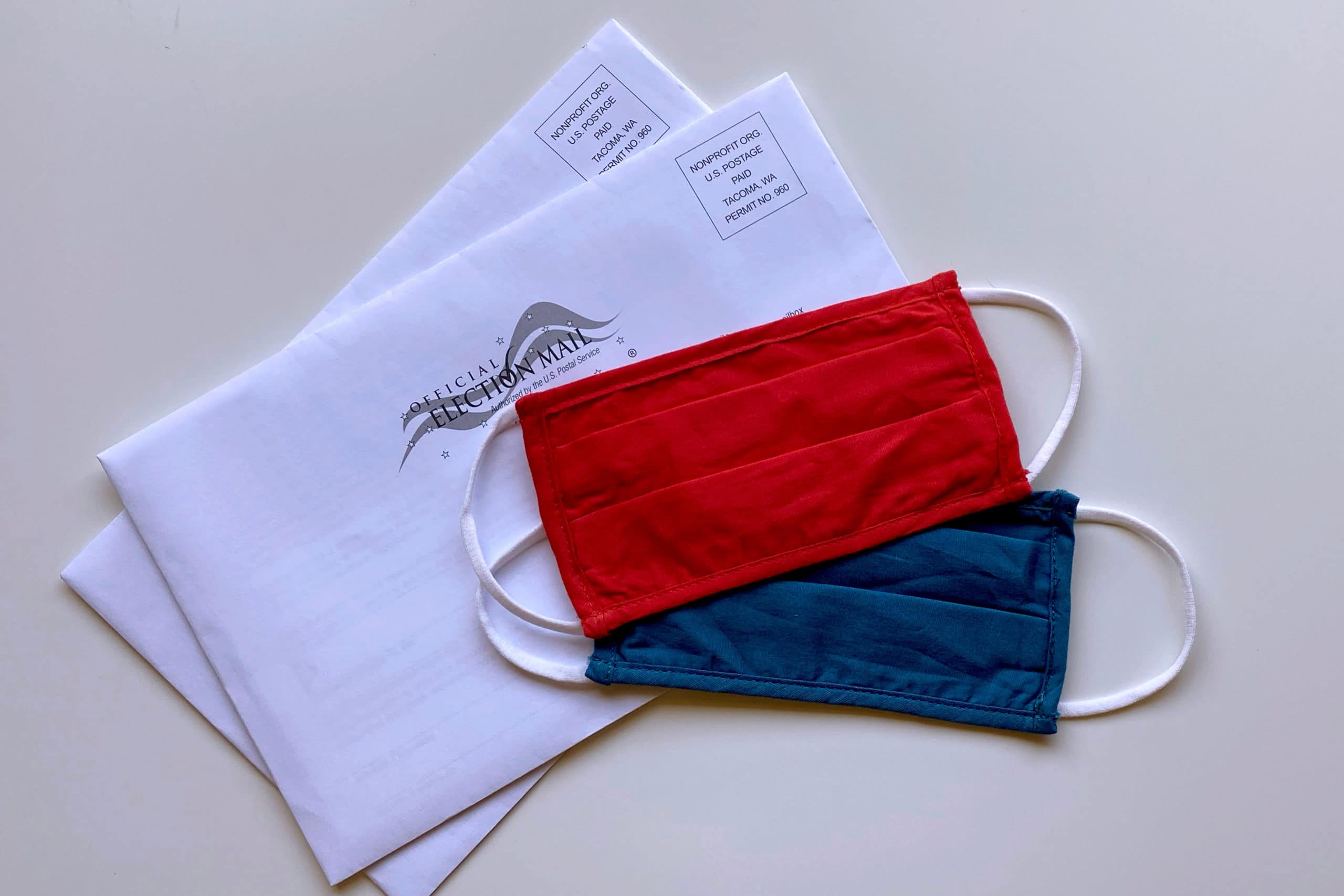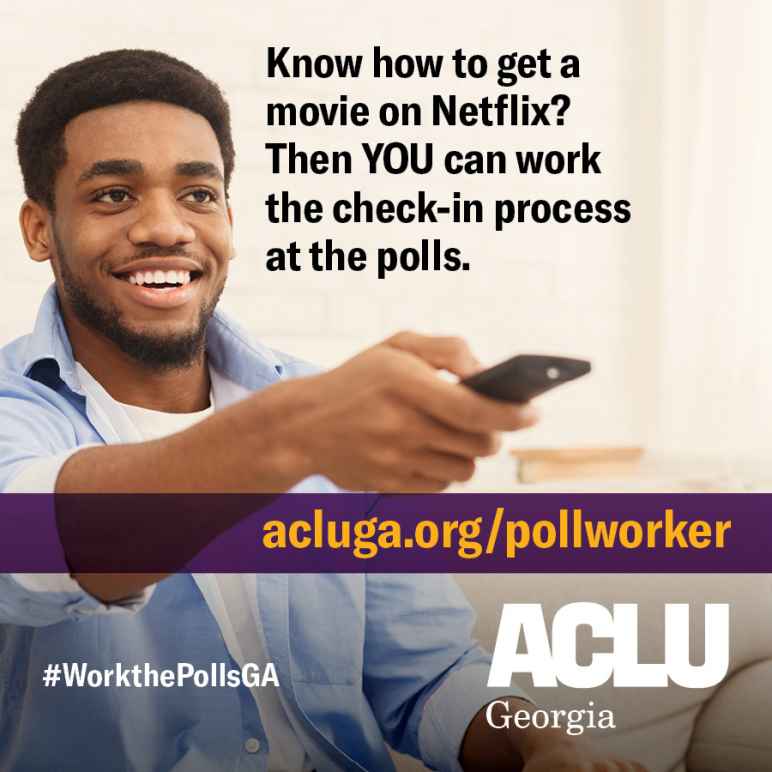
In a state with a legacy of voter suppression, dysfunctional primaries alarmed voters and voting rights advocates. Here’s how they’re working to ensure that all votes get counted in the general election.
Georgia voters and voting rights advocates are fighting for a free and fair general election this year in a state called “ground zero” for voter suppression. Technical problems with new voting machines, the closure of polling centers due to the coronavirus pandemic, a lack of provisional ballots, and record voter turnout kept some voters in line for several hours during the June primaries in what observers have called a “perfect storm”. Georgians have good reason to be concerned about a repeat during the general election.
As reported by NPR, Secretary of State Bradley Raffensperger (R) blamed the problems on local mismanagement. According to an analysis by the Atlanta Journal-Constitution, however, voters in majority-Black districts tended to face longer wait times than voters in majority-White districts – a result of understaffing and inadequate resources. At one polling center, only 1 voting machine out of 5 was working when the center opened.
In-person early voting in Georgia opened October 12 to many of the same problems. But voting rights organizations like Common Cause, Fair Fight Action, and Black Voters Matter are keeping up the pressure to improve the process and encourage people to vote.
Their efforts may have contributed to record voter turnout. As of October 28, the US Elections Project reports that more than 3.4 million votes have been counted so far – almost 50% of Georgia’s registered voters. Still, advocates are working overtime to make sure voter enthusiasm doesn’t become frustration in the face of confusing absentee procedures or long wait times.
“We are resolute in our actions to ensure every eligible voter can access the ballot,” ACLU of Georgia Executive Director Andrea Young said in a statement.
Voting Rights Defenders Take Action
The coronavirus pandemic has placed additional stress on an already vulnerable system. In the years since Shelby vs. Holder neutralized the Voting Rights Act, Georgia has been subject to increasing scrutiny over voter suppression. In 2017, the state removed over 650,000 people from the voter rolls in what has been called the largest voter purge in US history. In the lead-up to the 2018 election, another 53,000 voters – mostly people of color – were removed from voter rolls without their knowledge.
In this fraught context, voting rights advocates are fighting to protect the electoral process on a number of fronts.
Improving the Voter Registration Lists
The state took an important step to address its controversial treatment of its voter registration list by joining ERIC, the Electronic Registration Information Center. ERIC enables participating states to better maintain their voter registration databases and to identify eligible but unregistered voters.
While ERIC is not a perfect solution to the problem of voter purges, it can reduce the risk of abuses through a more robust list maintenance process that improves the tracking of voters who have moved, died, or otherwise changed their voting status. It also helps increase voter registration.
David Becker spearheaded the effort to create ERIC as a solution to the problem that most troubled election officials – voter registration. Read our profile of this American leader.
Voter Education
At the moment, the top priority of many voting rights organizations is educating voters — not only to boost turnout but to help them navigate early voting options.
Though it may feel like information about the election is impossible to avoid, that’s not necessarily the case for the average voter. “Political science common wisdom tells us that most people are not saturated — probably even in 2020 — with information,” says Dr. Jeffrey Lazarus, Professor of Political Science at Georgia State University.
Providing voters with information about the election can boost turnout, according to multiple studies in political science literature. Faced with low turnout rates among people of color, people with disabilities, and people under 35, voting rights organizations have acted accordingly.
Fair Fight Action, for example, maintains an active social media presence, sends mail, and texts voters. It contacted 900,000 voters in the Georgia primary and has continued these efforts in the lead-up to the general election.
But in this chaotic election year, simply turning out the vote is not enough.
Make a Plan
GEORGIA: If you want to elect champions for our families and country, make a plan to vote!
If you plan to vote by mail, request your ballot now so you have plenty of time to receive and return it by going to https://t.co/pP9K7Sp5zM #gapol 1/3 pic.twitter.com/roGb67ve4b
— Fair Fight (@fairfightaction) August 15, 2020
Amid widespread confusion about voting options during the pandemic, advocates’ messaging encourages voters not only to vote but to make a voting plan. Publicizing mail-in and drop-off options as well as in-person early voting could reduce long lines on Election Day. More than 20% of Georgians have already requested absentee or mail-in ballots, according to data from the US Elections Project.
Advocates hope early voting will counteract confusion and disinformation.
Poll Worker Recruitment
Nationally, the pandemic has contributed to a record shortage of poll workers, nearly 60% of whom are 61 and older, and are considered high risk. But there was a poll worker shortage before COVID-19. In 2018, 70% of jurisdictions nationwide reported problems recruiting enough poll workers.
When officials neglect poll worker recruitment, it results in personnel shortages that can lead to longer wait times at best, and poll closures at worst. When this occurs disproportionately in jurisdictions where the majority of voters are Black and Brown, it can be a form of voter suppression.
In 2013, the Supreme Court’s decision in Shelby v. Holder gutted the section of the Voting Rights Act that prevented election officials from easily closing polling locations. Georgia has closed 214 polling locations since.
In the Atlanta metropolitan area, nearly 80 additional polling places were closed for the primaries due to the pandemic. Election officials have announced that some of these polling places will be reopened for the general election.
Georgia’s progress in recruiting poll workers has contributed to these reopenings. The secretary of state set a goal of 20,000 new recruits prior to November 3rd. In early September, the Georgia Recorder reported that 15,000 had been recruited as a result of various advocacy groups advertising the position.

The work doesn’t end at recruitment. Poll workers still need to be trained. The Brennan Center recommended that Georgia precincts hold thorough training sessions well in advance of Election Day.
The Georgia secretary of state provided training materials on a dedicated website. Dominion, the company responsible for the state’s new electronic voting machines, held 24 two-day training sessions state-wide.
Ultimately, training is largely handled at the precinct level, where it’s up to local election officials to decide how much is enough. Given the new voting machines and the high number of first-time poll workers, it’s not clear, however, that precincts had sufficient time and resources to adequately train their staff.
Need for More Back-Up Paper Ballots
The Brennan Center and Common Cause filed suit on October 1 against the Georgia secretary of state to demand that the state require more back-up paper ballots at in-person polling locations.
“Unfortunately, our June primary elections showed that the current contingency plans are not sufficient. Although state Rules [sic] require polling places to have emergency ballots equal to 10% of the registered voters, many polling locations ran out of ballots on June 9”, Aunna Dennis, Executive Director of Common Cause Georgia, said in a prepared statement.
In a decision issued October 12, Judge Amy Totenberg declined to require a specific number of emergency ballots — the plaintiffs requested ballots for 40% of registered voters — but clarified that enough should be provided “so that voting may continue uninterrupted if emergency circumstances render the electronic ballot markers or printers unusable.”
The judge’s decision outlines a path forward for voting rights advocates. Election officials already have the authority to order extra paper ballots. The court decision encourages them to exercise that authority to have enough paper ballots on hand. It is at their discretion to use them after a power outage, technical malfunction, or wait time of more than 30 minutes — a threshold tens of thousands of voters crossed during the first week of early voting. Despite that fact, poll workers did not switch to paper ballots.
Resolute Voters Brave Long Lines As Early Voting Begins
When early voting began in Georgia on October 12, videos of lines stretching blocks circulated widely on social media.
The line of voters at George Pierce Park in Suwanee…. pic.twitter.com/3stVPEuyZp
— tyler, the reporter (@ByTylerEstep) October 12, 2020
Record numbers of voters are voting early. On the first day that polls opened, 128,000 people showed up to vote, more than in any previous Georgia election.
But those long waits were not spread equally throughout the state. “It appears to be that the people waiting in lines are disproportionately African-American, disproportionately urban, disproportionately young. And it stands to reason that given the people in control of the state of Georgia, that disparity is not an accident,” says Dr. Lazarus.
Despite the challenges, voters are determined. Armed with information about how to vote, voters who have historically faced suppression are prepared to persevere and cast their ballots.
Viola Hardy, a Black woman in Marietta, Georgia, arrived at the polls at 6 am and was still waiting five hours later. “It doesn’t matter how long it takes, we will stand in line to vote,” she told NBC-TV Atlanta reporter Andy Pierriotti, then added, “we’re voting like our life depends on it.”
Problem Addressed: Voting Rights
Written by Ciara McLaren and George Linzer
Published on Oct 29, 2020
Feature image: Tiffany Tertipes on Unsplash
Sources
Dr. Jeffrey Lazarus, phone interview with Ciara McLaren, Oct 15, 2020
John Nichols, “Georgia Shows How Serious the Threat of Voter Suppression Will Be This November”, The Nation, Jun 10, 2020, https://www.thenation.com/article/politics/georgia-voter-suppression-november/, accessed Oct 20, 2020
Blake Paterson, “Voter Purges: What Georgians Heading to the Polls Need to Know”, ProPublica, Oct 16, 2018, https://www.propublica.org/article/voter-purges-what-georgians-heading-to-the-polls-need-to-know, accessed Oct 20, 2020
Doug Chapin, “Number 27 Enters The Game: Georgia Joins ERIC”, Election Academy, May 23, 2019, https://editions.lib.umn.edu/electionacademy/2019/05/23/number-27-enters-the-game-georgia-joins-eric/, accessed Oct 20, 2020
Dareh Gregorian, Matteo Moschella and Jane C. Timm, “Early voting begins in Georgia with long lines, high turnout”, NBC News, Oct 12, 2020, https://www.nbcnews.com/politics/2020-election/early-voting-begins-georgia-long-lines-high-turnout-n1242995, accessed Oct 20, 2020
Stephen Fowler, “’It Was Very Chaotic’: Long Lines, Voting Machine Issues Plague Georgia Primary”, NPR, Jun 9, 2020, https://www.npr.org/2020/06/09/873054620/long-lines-voting-machine-issues-plague-georgia-primary, accessed Oct 20, 2020
Mark Niesse and Nick Thieme, “Extreme voting lines expose where Georgia primary failed”, AJC, Jul 28, 2020, https://www.ajc.com/politics/extreme-voting-lines-expose-where-georgia-primary-failed/YQUMSTEBVFAY7CR7UQOQEHSVLI/, accessed Oct 20, 2020
Michael P. McDonald, “Georgia Early Voting Statistics”, United States Elections Project, 2020, https://electproject.github.io/Early-Vote-2020G/GA.html, accessed Oct 20, 2020
Stanley Dunlap, “Election lawsuits still playing out as Georgia voters start casting ballots”, Georgia Recorder, Oct 9, 2020, https://georgiarecorder.com/2020/10/09/election-lawsuits-still-playing-out-as-georgia-voters-start-casting-ballots/, accessed Oct 20, 2020
Angela Caputo, Geoff Hing, and Johnny Kauffman, “After the Purge: How a massive voter purge in Georgia affected the 2018 election”, APM Reports, Oct 29, 2019, https://www.apmreports.org/story/2019/10/29/georgia-voting-registration-records-removed, accessed Oct 20, 2020
Jeffrey Lazarus, “Most expensive race in House history turns out nearly 58 percent of Georgia district’s voters”, The Conversation, Jun 21, 2017, https://theconversation.com/most-expensive-race-in-house-history-turns-out-nearly-58-percent-of-georgia-districts-voters-76495, accessed Oct 20, 2020
William Roberts, Danielle Root, and Michael Sozan, “Recruiting and Retaining Poll Workers During the Coronavirus Pandemic”, Center for American Progress, Sep 21, 2020, https://www.americanprogress.org/issues/democracy/reports/2020/09/21/490586/recruiting-retaining-poll-workers-coronavirus-pandemic/, accessed Oct 20, 2020
“Democracy Diverted”, The Leadership Conference on Civil & Human Rights, 2020, https://civilrights.org/democracy-diverted/, accessed Oct 20, 2020
Gilad Edelman, “Georgia’s Failure Shows How Not to Run an Election in the Pandemic”, Wired, Jun 10, 2020, https://www.wired.com/story/georgia-failure-how-not-to-run-election-pandemic/, accessed Oct 20, 2020
Mark Niesse, “Churches reopen doors to Georgia voters in need of more polling places”, AJC, Aug 21, 2020, https://www.ajc.com/politics/churches-reopen-doors-to-georgia-voters-in-need-of-more-polling-places/YEYATUZS7RHAVBCLDESFEEEWJQ/, accessed Oct 20, 2020
Stanley Dunlap, “Georgia signs on 15,000 poll workers in run up to November voter surge”, Georgia Recorder, Sep 9, 2020, https://georgiarecorder.com/2020/09/09/georgia-signs-on-15000-poll-workers-in-run-up-to-november-voter-surge/, accessed Oct 20, 2020
“Protecting Election 2020 from Covid-19: A Toolkit for Georgia Activists”, The Brennan Center, Aug 19, 2020, https://www.brennancenter.org/our-work/research-reports/protecting-election-2020-covid-19-toolkit-georgia-activists, accessed Oct 20, 2020
Aunna Dennis, “Common Cause Georgia, the Brennan Center ask Federal Judge to Require More ‘Emergency’ Paper Ballots”, Common Cause Georgia, Oct 1, 2020, https://www.commoncause.org/georgia/press-release/common-cause-georgia-the-brennan-center-ask-federal-judge-to-require-more-emergency-paper-ballots/, accessed Oct 20, 2020
Mark Niesse, “Judge rejects more emergency paper ballot backups at Georgia polls”, AJC, Oct 13, 2020, https://www.ajc.com/politics/judge-rejects-more-emergency-paper-ballot-backups-at-georgia-polls/D22C4LCBMRDOPDT2FFGLIHUHAE/, accessed Oct 20, 2020
Andy Pierrotti, “As of 11am, voters waited 5+ hours to cast ballots @ the main Cobb Co. early polling location (736 Whitlock Ave, Marietta)”, Twitter, Oct 12, 2020, https://twitter.com/AndyPierrotti/status/1315716720284381186, accessed Oct 20, 2020
U.S. Election Assistance Commission, “EAVS Deep Dive: Poll Workers and Polling Places”, Nov 15, 2017, https://www.eac.gov/documents/2017/11/15/eavs-deep-dive-poll-workers-and-polling-places, accessed Oct 29, 2020
U.S. Election Assistance Commission, “Election Administration and Voting Survey: 2018 Comprehensive Report”, 2019, https://www.eac.gov/sites/default/files/eac_assets/1/6/2018_EAVS_Report.pdf, accessed Oct 29, 2020
David Lassen, “The Effect of Information on Voter Turnout: Evidence from a Natural Experiment”, American Journal of Political Science, 49(1), 103-118, Jan 2005, https://www.jstor.org/stable/3647716, accessed Oct 29, 2020
Have a Suggestion?
Know a leader? Progress story? Cool tool? Want us to cover a new problem?


